|
The Greatest Betrayal – 9:
Paying for his sins
by K. M. H. C. B. Kulatunga
Former Army Commander Sarath Fonseka who eventually betrayed the
nation, the people and the Security Forces finally had to pay the price
for the costly exercise. Not only would Fonseka pay for his sins, but
Sri Lanka too will have to pay the price for Fonseka’s concocted stories
such as that infamous ‘white flag’ incident.
When the Sunday Leader initially wrote the story, along with an
interview with Fonseka, he denied making such a statement. But the
newspaper stood by its story written by none other than its chief, the
editor.
In his greed for power, Fonseka appeared to be willing to do anything
and everything. That was precisely why he went to the very extreme of
betraying the forces which he commanded once. Though the UNP and the JVP
are projecting Fonseka as the greatest military hero of all time, the
person we see today is not the same Fonseka who commanded the Sri Lanka
Army during the humanitarian operation.
What we find today is politician Fonseka and not General Fonseka. It
is important that we differentiate the two characters properly. It is
crystal clear that politician Fonseka, who unsuccessfully contested the
last Presidential Election under the New Democratic Front has betrayed
the country and its valiant Security Forces by fabricating a story.
Fonseka, during his infamous interview with the Sunday Leader, said
it was the Defence Secretary who ordered to kill some of the LTTE
leaders who were surrendering, waving white flags.
In saying so, Fonseka not only risked the lives of the soldiers of
the 58 Division and its former Commander Major General Shavendra Silva,
but also brought the entire Sri Lanka Army into disrepute.
Even during the 2006-2009 humanitarian operations, the Sri Lanka Army
conducted themselves in an exemplary manner and earned respect as the
most disciplined Army in the world. But Fonseka’s thirst for power and
petty political and personal goals vanquished all that in a flash.
Fonseka even went to the extent of saying that he is prepared to give
evidence in an international court on war crime charges against Sri
Lanka. Speaking to journalists in Colombo last Monday, Fonseka said, “I
am not going to save anyone who has committed war crimes”.
International human rights organisations as well as the US State
Department have alleged that the Sri Lankan Government committed war
crimes during the final phase of the war against the LTTE.
Several human rights organisations have called to try the Sri Lankan
State in international courts on alleged abuses against civilians and
surrendees.
“I am definitely going to reveal what I know, what I was told and
what I heard. Anyone who has committed war crimes should definitely be
brought to courts,” the Retired Army General said.
Could we find a bigger traitor in the annals of Sri Lanka?
|
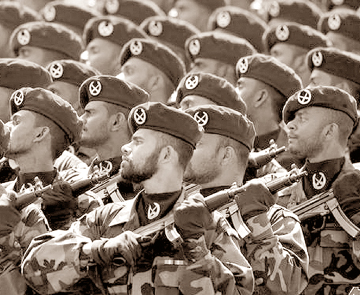
Fonseka betrayed the very Security Forces he once led |
Trial of offenders who have ceased to be subject to military law of
the SLA Act states; 57 (1) Where a person subject to military law
commits any offence and thereafter ceases to be a person subject to
military law, he may be taken into and kept in military custody and be
tried and punished for that offence by a Court Martial: Provided that he
shall not be so tried after the lapse of six months from the date of the
commission of such offence unless such offence is the offence of mutiny,
desertion, or fraudulent enlistment.
Under the circumstances, the authorities had no option but to arrest
Fonseka and maintain law and order as the law of the land is supreme.
Though Fonseka’s arrest was made under the SL Army Act according to
the law, the Opposition, mainly the UNP and the JVP, are making
desperate attempts to give it a political twist and gain undue political
sympathy. They have even persuaded certain countries in the West to
obtain sympathy.
What the international community and the Opposition political parties
should realise is that Fonseka was arrested not as a defeated candidate
at the Presidential Elections, but as a former Army officer who has made
damaging statements for political mileage, risking the lives of the
soldiers who had fought bravely to rescue innocent civilians under the
LTTE terror and liberate our country from terrorism.
It was due to the shameless, irresponsible, sensitive and fabricated
statement of Fonseka that Sri Lankan Security Forces killed LTTE leaders
surrendering waving white flags, that Sri Lanka and its Head of State
President Mahinda Rajapaksa, had to give evidence.
It was for this purpose that Minister Mahinda Samarasinghe and
Attorney General Mohan Peiris went to Geneva last week to clear Sri
Lanka’s name and save our Security Forces over Fonseka’s statement.
The UNP and the JVP must clearly state whether they would like to see
the law of the land be supreme at all times or not. If so, they should
not demand the release of Fonseka as prosecuting Fonseka for the crimes
he had alleged to have committed is a legal process.
Fonseka was just one Commander involved in the humanitarian battle.
Could we grant him immunity against the law of the land merely
because he was a commander who had taken part in the battle against
terror? If so we must grant such immunity for all others who had taken
part in the war. How could we maintain law and order then?
The UNP, along with their new-found ally JVP, must act as a
responsible Opposition. They should not get their priorities mixed up
for petty political gains.
Fonseka’s politics and his conduct as an ex-Army officer disclosing
sensitive military secrets are entirely two different issues.
Are the UNP and JVP shielding traitors? Perhaps that too could be
understood; the two parties have a notorious history of betraying the
nation and its people.
|
Fonseka’s arrest legal
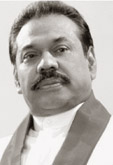 UNP and Opposition Leader
Ranil Wickremesinghe met President Mahinda Rajapaksa at
Temple Trees and among the matters they discussed was the
arrest and detention of Retired General Sarath Fonseka, a
press release from the President’s Media Division said. UNP and Opposition Leader
Ranil Wickremesinghe met President Mahinda Rajapaksa at
Temple Trees and among the matters they discussed was the
arrest and detention of Retired General Sarath Fonseka, a
press release from the President’s Media Division said.
The President explained to
the Opposition Leader that the arrest and detention of
Sarath Fonseka was not an act against him, but an Army
disciplinary step. Fonseka has been provided with facilities
to appeal against his arrest to the Supreme Court.
He said investigations
regarding the case would be done expeditiously.
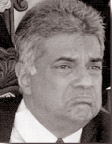 The Opposition Leader asked
whether someone other than Mrs. Anoma Fonseka could be
permitted to take food and other necessities to Fonseka and
the President replied that it could be arranged by the Army
Commander. But he had seen media reports that Mrs. Fonseka
wished to take meals for her husband and if she so wished
she could take meals to him. The Opposition Leader asked
whether someone other than Mrs. Anoma Fonseka could be
permitted to take food and other necessities to Fonseka and
the President replied that it could be arranged by the Army
Commander. But he had seen media reports that Mrs. Fonseka
wished to take meals for her husband and if she so wished
she could take meals to him.
President Mahinda Rajapaksa
said he could recall that he too was detained for serving
the public, his wife Shiranthi who was pregnant at the time
brought his meals to the remand prison, the press release
stated. |
|
Anyone
violating law must be penalised - PM
by Suraj
A. Bandara
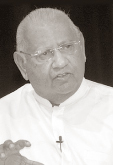 The law is above all and
everyone should abide by the law, Prime Minister Ratnasiri
Wickramanayaka said. Speaking at a function to admit Year
One students to Thalagala Junior School, the Prime Minister
said the period where the jungle law flourished is no more. The law is above all and
everyone should abide by the law, Prime Minister Ratnasiri
Wickramanayaka said. Speaking at a function to admit Year
One students to Thalagala Junior School, the Prime Minister
said the period where the jungle law flourished is no more.
“Whoever violates the law
must be penalised. No one can work arbitrarily to fulfil
their sinister purposes by utilising their power in the
society. The Government will never allow anybody to tarnish
Sri Lanka’s image,” he said.
The Prime Minister said when
some countries insisted that we draw our policies according
to their agendas, we undertook our own method to develop the
country. “Doors are open for those who work honestly for the
country’s development. We should love our Motherland and not
deceive the people. If we don’t love our country, how can we
love the people?” the Premier queried. |
|
Fonseka arrested to safeguard country’s image - SB
by
Shirajiv SIRIMANE and Sarath MALALASEKERA
Seasoned politician S. B.
Dissanayake said arresting former Army Commander and former
Chief of Defence Staff, Sarath Fonseka was a timely move.
Speaking to the Sunday
Observer he said the arrest was not directed at Sarath
Fonseka or was fulfilling a personal vendetta but was
initiated to safeguard the international image of the
country.
He said Fonseka had accused
some very senior Security Forces commanders of committing
war crimes and had even gone to the extent of divulging
military secrets. “He had also stated that he would speak
more of the ‘so called’ military violations which would have
been detrimental not only to the Government, but also to the
Security Forces that fought a humanitarian battle respecting
all norms of war against the world’s deadliest terrorist
organisation”. He said comments the former General made such
as the white flags issue had a direct negative impact such
as European nations taking off the GSP concession. “This is
a grave crime,” he added.
These comments would also
have a negative impact when the Government is channelling
for international aid.
If the former General was
left alone to carry on his ‘talk’, even the United Nations
may think that there is some truth to it. “This is why an
inquiry should be held against Fonseka and the truth be told
to the world,” Dissanayake added.
He said arrests of this
nature are not uncommon. Soon after the Second World War,
America arrested Japanese citizens in large numbers as a
precautionary measure.
There was the Official
Secrets Act applicable to all Forces personnel and high
officials.
Even in the UK or USA
similar laws were in force. When General Dwight Eisenhower
contested the US Presidency five years after retirement, he
did not reveal any military secrets for his political
advantage.
Politicians including
President Mahinda Rajapaksa had been detained for serving
the public; his wife Shiranthi, who was pregnant at the
time, brought his meals to the remand prison.
Minister of Export
Development and International Trade, Prof. G.L. Peiris said
even Presidential candidates are not immune from the law and
said, Fonseka’s arrest was legal. Equality before the law
was guaranteed by the Constitution to all other than the
immunity provided to the President and Ambassadors or High
Commissioners of sovereign states, Prof. Peiris told the
weekly Cabinet press briefing.
“Everybody else is subject
to the rule of law and no exception could be made to a
Presidential candidate,” he said.
“The military law exists
from 1949 without addition or subtraction and we follow the
military law of England,” he said. Therefore, if one was not
satisfied with the decision of a military court the right of
appeal to the Supreme Court was available under the law, the
Minister said.
The President who met
Opposition Leader Ranil Wickremesinghe explained that the
arrest and detention of Sarath Fonseka was not an act
against him, but an Army disciplinary step. Fonseka has been
provided with facilities to appeal against his arrest to the
Supreme Court. The President said expeditious investigations
regarding the case would be carried out.
There was no derogation
whatsoever in the legal process. All legal safeguards are
available in the judicial process.
Senior Attorney-at-Law Upali
Senaratne said, “Retired Gen. Sarath Fonseka was taken to
custody by the Military Police. In terms of Sec. 57 of the
Army Act if any person subject to military law, commits an
offence and thereafter ceases to be a person subject to
military law they can be taken in to and kept in military
custody and tried and punished for the offence by a Court
Martial provided that they shall not be so tried after the
lapse of six months from the date of the commission of such
offence unless such offence is the offence of mutiny,
desertion or fraudulent enlistment. Mutiny is defined in
Black’s Law Dictionary as an uprising against authority.
Court Martial is convened in terms of part 9 of the Army Act
and how it is held is set out in the Court Martial general
and district regulations. Summary of evidence will be served
on the General for his views, comments and defence before
the trial is held.” He said, “Since I have attended a number
of Court Martial inquiries, I am quite aware as to how these
Court Martials are held and the respect with which the
accused are treated before a Court Martial. At the Court
Martial the Judge Advocate deals with the law and explains
to the panel the legal aspects and there is a Prosecutor who
prosecutes at the Court Martial. The Accused can be defended
by any lawyer of his choice.” |
|
Court Martial or civil trial on
AG’s advice:
Fonseka arrested under Army Act
|
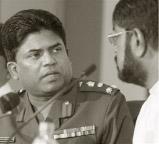
Military Spokesman Major General Prasad Samarasinghe
Defence Affairs Spokesman Minister Keheliya
Rambukwella at the media briefing. |
Military Spokesman Major
General Prasad Samarasinghe said the Sri Lanka Army will
decide to hold a trial on the evidence against retired
General Sarath Fonseka either at a Court Martial or Civil
Court after the summary of evidence is forwarded to the
Attorney General for his advice.
Addressing the media at the
Media Centre for National Security, Defence Affairs
Spokesman Minister Keheliya Rambukwella said the former Army
Commander and Chief of Defence Staff General Sarath Fonseka
was arrested by the Military Police on Monday at around 9.00
pm on charges of committing alleged violation of Military
law during his tenure as the CDS.
The Security Council (SC) is
the highest body which deals with the most secret national
security decisions. Fonseka was a prominent member of the SC
when he was the Army Commander and the CDS. “While he was a
member of the SC, he had conducted and shared deals with
political parties against the Government which he shouldn’t
have done as a military official,” he added.
Minister Rambukwella said
any officer or soldier in the Army who commits an offence
during their service time and thereafter is subject to
military law and may be taken into custody and kept in
military custody by a Court Martial under Article 57(1) of
the Army Act. The legal proceedings will be continued after
that. There are many others - military and civilian - who
were involved with Fonseka who were also arrested. Some
others are yet to be arrested. The CID and police are
investigating. Legal action will be taken against them.
Answering a question by a
journalist whether the law permits the arrest of a retired
Army Officer, Minister Rambukwella said if a soldier or an
Army Officer breaches the Military Code of Conduct during
service, the military can take action within six months of
their retirement. He said there are many charges against
Fonseka. Maj. Gen. Samarasinge noted that the summary of
evidence collected from the Military and civilians who were
involved in alleged military offences with the former Army
Commander and CDS General Fonseka will be forwarded by the
Military Legal Department to the AG for his advice. The
Military will decide thereafter to bring Fonseka before a
Court Martial or before a normal Court of Law..
He observed that Fonseka’s
lawyer as well as his family have been granted unhindered
access to the detainee and full medical assistance as per
his request. “He was treated as a former Army General
without any discrimination”, he added. When a journalist
queried about why General Fonseka was not arrested for his
offences while he was the CDS, Minister Rambukwella said
when a complaint is lodged against a person on allegations
there is a legal procedure. Initially evidence should be
gathered and verified. “We have credible evidence and
information. Besides, Fonseka was a Presidential candidate
at that time,” he added. |
|
Firsthand
account of drama leading to Fonseka’s arrest
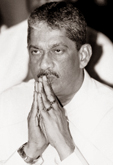 The scene: office of an
important person located at Rajakeeya Mawatha, opposite
Royal College, Colombo. The scene: office of an
important person located at Rajakeeya Mawatha, opposite
Royal College, Colombo.
The time: 10 pm on Monday.
The Provo Martial of the
Military Police Brigadier Wijesri enters the office with
authority. He is accompanied by Maj. Gen. S.R. Manawaduge,
Commandant of the Western Province and Puttalam, and the
Colonel of the Commando Regiment. Police top echelons are
also present.
The Provo Martial of the
Military Police Brigadier has an important assignment on
hand, that has already been the talk of the town. Only the
timing was not known and how it was to be carried out.
The assignment is carrying
out the State’s order - the arrest of the former Army
Commander and Chief of Defence Staff Sarath Fonseka, the
unsuccessful Presidential candidate.
As the military top brass
enter the office, Mano Ganeshan, leader of the Democratic
People’s Front, Somawansa Amarasinghe, leader of the Janatha
Vimukthi Peramuna, Rauff Hakeem, leader of the Muslim
Congress, and retired Army Captain Senaka Arnold Haripriya
de Silva alias Captain Shah Silva are seated there.
The Army asks the political
associates to leave the place for them to perform their
military duties without any let or hindrance. Nay, it is an
order.
While the politicians refuse
to leave the premises, Captain Shah Silva starts abusing the
Army officers in filthy language and begins to curse the
Head of State, Asian Tribune learnt. He was arrested and
handed over to the police who was wanted by them, as he was
evading arrest.
Fonseka is wearing
short-sleeved white shirt, brown pants and shoes.
Subsequently, the Provo
Martial of the Military Police Brigadier Wijesri informs
Fonseka politely about his impending arrest. Sarath Fonseka
demands that he should be arrested only by the Police.Even
though there are leading police personnel present along with
the Army personnel, Brigadier Wijesri, the head of the
Military Police, says that they have come to make a military
arrest and reads out the charges against Fonseka.
The main charges are:
* Politicking whilst in
uniform
* Conspiring against the
Commander-in-Chief whilst in Service,
* Harbouring more than 1,500
deserters whilst on service,
* And corrupt practices in
relation to military procurement.
After reading out the
charges the Military Police chief requests Fonseka to follow
them to the vehicle to be taken out.
As Fonseka refuses to
cooperate with Military officers who came for his arrest on
the orders of the Commander of the Sri Lanka Army, and
starts to abuse the officers in utter filth as usual, the
Army officers told Asian Tribune that they had to carry him
to the vehicle by force.
Asian Tribune learnt that
later Fonseka agrees to walk the distance to the vehicle and
is allowed to walk. The former Army Commander is taken in a
bullet-proof Land Rover and is lodged in one of the quarters
located at the Sri Lanka Navy Headquarters.
Asian Tribune |
|
SC grants
leave to proceed
by
Sarath MALALASEKERA and Wasantha RAMANAYAKE
The Supreme Court granted
leave to proceed with the fundamental rights applications
filed by Anoma Fonseka, wife of Sarath Fonseka and New
Democratic Front Secretary Shamila Perera.
The Court granted leave to
proceed in connection with alleged infringements of Articles
11, 12 (2), 13 (1) and 13 (2) of the Constitution. The
petitioners reserved their rights to support for certain
other right violations guaranteed under the Constitution.
The Court also directed respondents to permit the first
petitioner Anoma Fonseka to accompany an Attorney-at-Law and
a Justice of Peace, enabling Fonseka to sign legal
documents.
The petitioners also
reserved their rights to support an interim order i.e.
seeking the release of third petitioner Sarath Fonseka and
an order to ensure his safety while in custody.
The Bench comprised Chief
Justice Asoka de Silva and Justice Shiranee Tillekewardena
and Justice Chandra Ekanayake. |
|
Fonseka
repaying for his sins, says Maj. Gen. Pannipitiya’s wife
 Retired General Sarath
Fonseka who is in military custody now interdicted my
husband, Major General Parakrama Pannipitiya’s service with
immediate effect from the Army following an anonymous letter
sent by a person who worked against my husband, said
Pannipitiya’s wife Achini Iroma Pannipitiya. Retired General Sarath
Fonseka who is in military custody now interdicted my
husband, Major General Parakrama Pannipitiya’s service with
immediate effect from the Army following an anonymous letter
sent by a person who worked against my husband, said
Pannipitiya’s wife Achini Iroma Pannipitiya.
She said Fonseka’s plight
now is a retribution of Kamma.
“He took action against my
husband with a wicked mind and he wanted to take revenge
from my husband. Now the tables have turned and he is
repaying for the sins he accumulated when he was in
service,” she added.
“Ironically, Anoma Fonseka,
my intimate friend at one time, who abandoned me on that
occasion with my innocent little children, is how pleading
for mercy from women to save her husband. But she didn’t
hear my grievances when I became a victim due to her
husband’s cruelty,” she said.
“Maj. Gen. Pannipitiya also
worked for the Sri Lanka Sinha Regiment. When he was
interdicted, my children and I became helpless since we lost
everything. I had no one to tell my grievances,” Achini
said.
According to her, she did
not go after people or attempt to rally women but prayed to
the deities.
“I obeyed the law when my
husband was interdicted from military service and appealed
only to the Supreme Court.
“I was suffering for an
offence my husband did not commit. At that time my children
were very small unlike the Fonseka’s children who are grown
up now. My eldest daughter was then only 12. The two sons
were aged five and four. I was thrown out to the streets
within a month as the official residence was withdrawn. Only
President Mahinda Rajapaksa helped me at the time. It is
because of his sympathetic and humanely qualities that he
won this victory. My husband was interdicted on the basis of
an anonymous letter.
“They did not even give the
half pay as promised. Nobody from the Army was sent even to
find out how we were faring. My husband also took part in
the Eastern operation. However his name was not mentioned
because Sarath Fonseka did not like him,” she said.
|
|

